News
As Rock and Roll took over the world in the 1950s and revolutionised popular music, Egypt had just emerged from the 1952 revolution, which overthrew King Farouk’s monarchy. Young Egyptians had a newfound spirit of taking matters into their own hands, inspired by the DIY spirit of the genre. Traditionally, up until that point, Western cover bands were dominated by English, French, and Italian expats living in Egypt. However, Egyptian society had undergone a reshuffling of sorts by the time the Suez Crisis rolled around in 1956. With its large expat community being forced to leave the country and restrictions being placed on imports, Rock and Roll took hold of more and more people, many of whom were willing to go to great lengths to play music.
“I built my first electric guitar. It was tough to buy one at the time,” recalls Pino Phares, guitarist of Les Petits Chats from 1970 to 1989. “I had some wood cut to size, and my dad owned an auto repair workshop at the time, so I had it painted in gold there. I had to make my own pickups, too. I used to take the small microphones and magnets from the old dial telephones and use the copper wire in car spark plugs.”
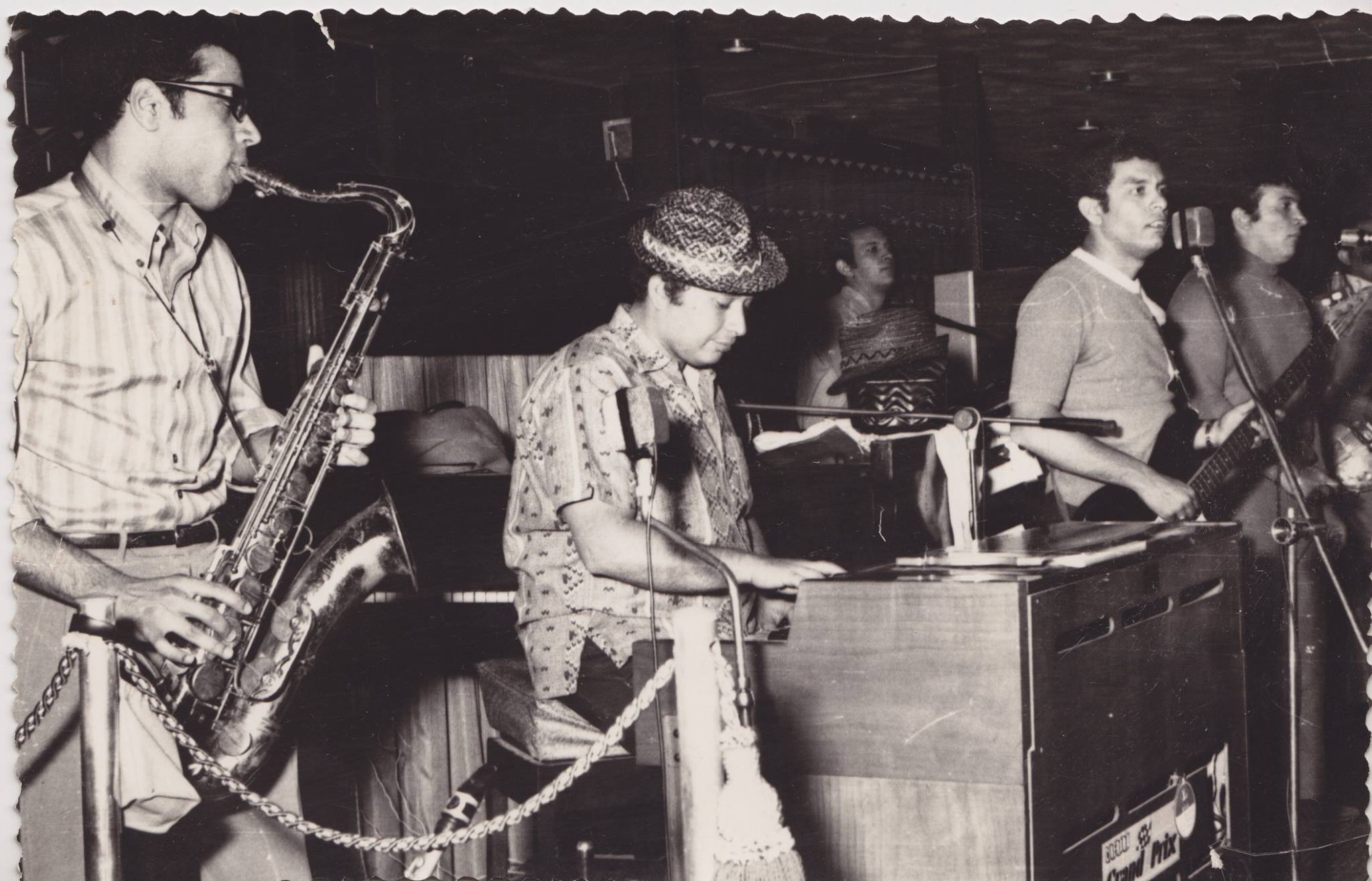
While Pino and many others like him were experimenting with friends – playing at home, or still in the early stages of forming their bands – a band named The Skyrockets had already started their career out of Cairo’s Helmiyah neighbourhood in 1957. While not purely a rock band, they’ve often been credited with introducing the genre by covering Billy Hailey & The Comets’ Rock Around the Clock album. After a smashing success at a New Year’s Eve performance at the Heliopolis Sporting Club and a residency at the Heliopolis Palace Club, the group had landed an appearance in the movie Al Wesada Al Khaliya (1957) starring Abdel Halim Hafez and another just a year later in Youssef Chahine’s quintessential Bab Al Hadid (Cairo Station) in 1958 opposite the iconic Hind Rostom.
Yehia El Shamaa, saxophonist of The Black Coats from 1968 to 1971, reminisces, “When I was around 15 or 16, my best friend Yervant and I would walk from Shoubra to the Nile corniche almost daily to hear The Skyrockets perform at Casino El Shagara. We’d just sit outside by the water and listen to them because we were kids and couldn’t afford entry. We still had a great time.”
One of The Skyrockets’ founders, singer and guitarist Asaad Kelada, would move to study directing at Yale in 1961 after the recommendation of Youssef Chahine, eventually directing episodes of classic shows like Rhoda, Two and a Half Men, Sabrina The Teenage Witch, and The Office many years later. The Skyrockets would continue in different iterations until the late ’60s. As they enjoyed the first wave of relative mainstream success, more amateur bands were bringing forth solid formations and performing at their schools or social clubs at the time. These included bands like The Saints, The Birds, Spyder, The Tramps, and, more prominently, The Mass.
Founded in 1965 by Mourad Rouchdi and Ali Hazzah, The Mass was more inspired by The Beatles and The Rolling Stones than the local bands, which focused mainly on European music and 1950s American Rock. The band found success playing at the American University of Cairo and at private events. Historian Samir W. Raafat wrote in the Egyptian Mail on October 4, 1997: “Cairo’s hippies in various degrees of beads, stringy hair and pointed high heel shoes adored The Mass and showed it. At every concert, they turned up en masse screaming and shouting. The animate group was their direct link to the throbbing music scene in Europe and America. It was during these pop concerts that they could vent their adolescent confusions, excitement, anger, and pain.”
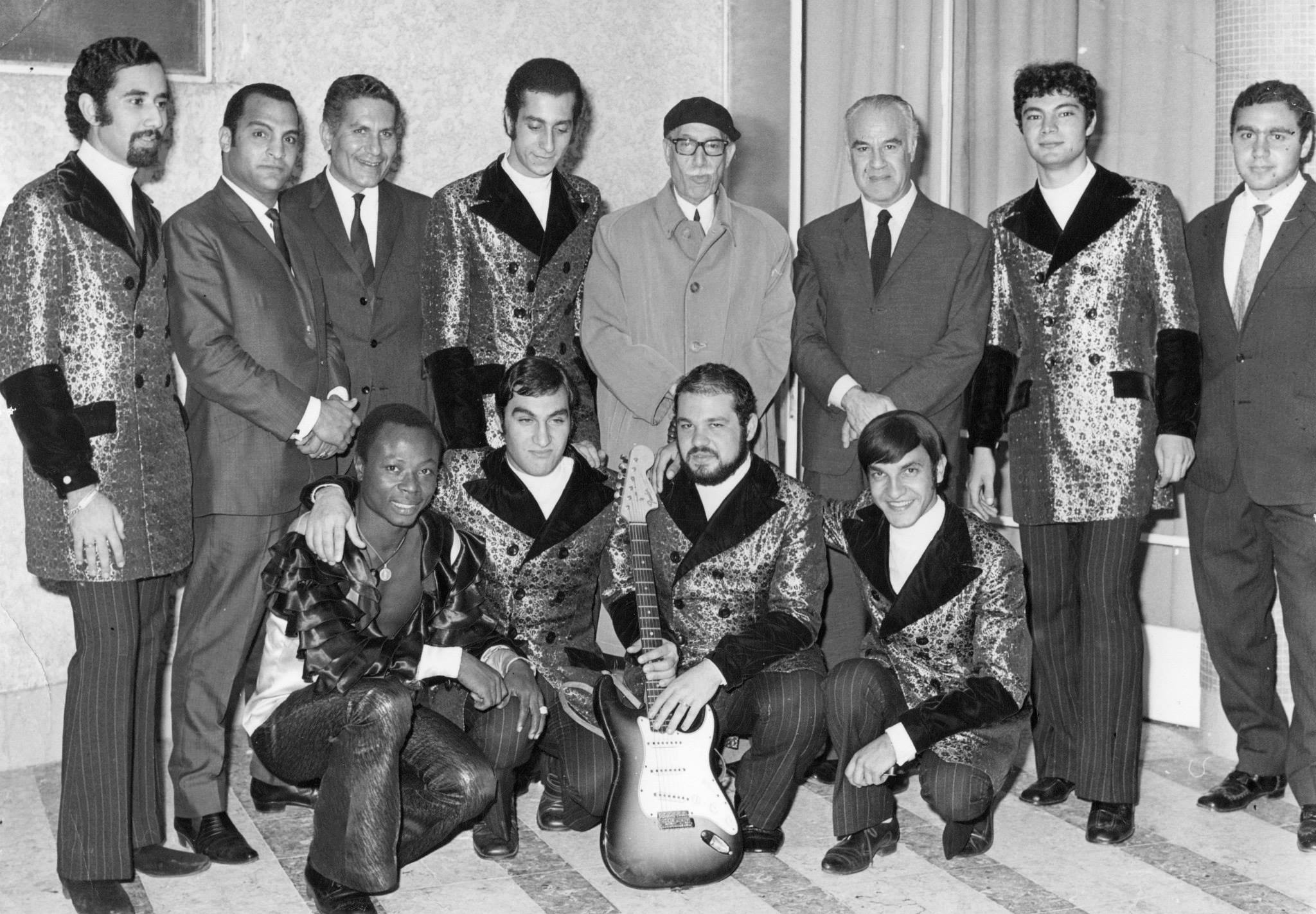
The Mass continued until 1975 with some memorable concerts during the summer at venues like Agami Palace and Georges Casino on the Mediterranean coast. One of the most notable members of the band is media and advertising mogul Tarek Nour, who joined the band early on and even included one of the band tracks in one of his earliest adverts in the 1970s, which featured footballing legends Bibo, Hassan Shehata, Farouk Gaafar and Taher ElSheikh for a brand of shaving cream.
During that period, dozens of bands formed. Some found greater success than others, even touring outside of Egypt, like The Stardust, which played across Europe and the Middle East from Kuwait City to Geneva between 1968 and 1978. Many of the Stardust band members continued as The Stars, and in 1979, they narrowly escaped from Tehran after performing there with the help of the Shah of Iran’s son’s secretary.
Yet, whenever that era is mentioned, two definitive, well-documented bands stand out in that generation’s memory; The Black Coats and Les Petits Chats. Founded in 1966 and 1967, respectively, the bands dominated the cover band scene, particularly during the summers in Alexandria and winters in Cairo with their famous matinee concerts. As a quartet, the Black Coats were founded by Ismail Al-Hakim, son of esteemed Egyptian author Tawfiq Al-Hakim. In 1968, however, inspired by Otis Redding’s brassy arrangements, he sought to grow the band and include saxophone and trumpet players.
This new arrangement debuted at a massive solo concert at Gezira Sporting Club Basketball Court in 1968. “I believe it was the first solo concert for a rock band at this scale. It was a couple of thousand people and a massive stage with big spotlights. They introduced us one by one on stage. I remember our drummer Sherif Zaza even getting sick looking at the thousands of people in attendance right before he got on stage,” Yehia El Shamaa recalls.
The entire band would practically move in together at Ismail’s house in Helwan, where they rehearsed nearly every hour of every day. This camaraderie, paired with Ismail’s dedication to getting the band the best sound systems, outfits, and stage lights and importing what is often regarded as Egypt’s first Hammond organ, undoubtedly led to their finding success very early on.
“Ismail was a visionary; everything was always mapped out in his head. He lived for music and The Black Coats. He was incredibly talented, too. He took inspiration from the likes of Jimi Hendrix and had truly remarkable talent and stage presence. I can never forget how he used to play Santana’s ‘Black Magic Woman’ on the guitar; it was almost like hearing the original record,” Yehia added.
By 1971, The Black Coats had cultivated a considerable following for their boisterous repertoire. They had landed summer residencies at El Montazah palace’s Haramlek gardens for several summers in a row, together with Les Petits Chats, who were attracting an equal amount of people just 10 minutes away in Alexandria’s Palestine Hotel with their more pop-savvy, romantic setlist. Both bands’ stories were intertwined as two of the most exciting bands Egypt had seen up until then. You weren’t cool if you weren’t at The Black Coats or Les Petits Chats matinees in the summer.
Composer Hani Shenouda confirmed this by saying, “Some kids would see both bands on the same day. They’d come to see us first [Les Petits Chats] and listen to all the pop stuff, and then they’d go see Ismail and The Black Coats let loose to some more rock music. It was like an invisible collaboration between both bands, and kids wanted a bit of everything.”
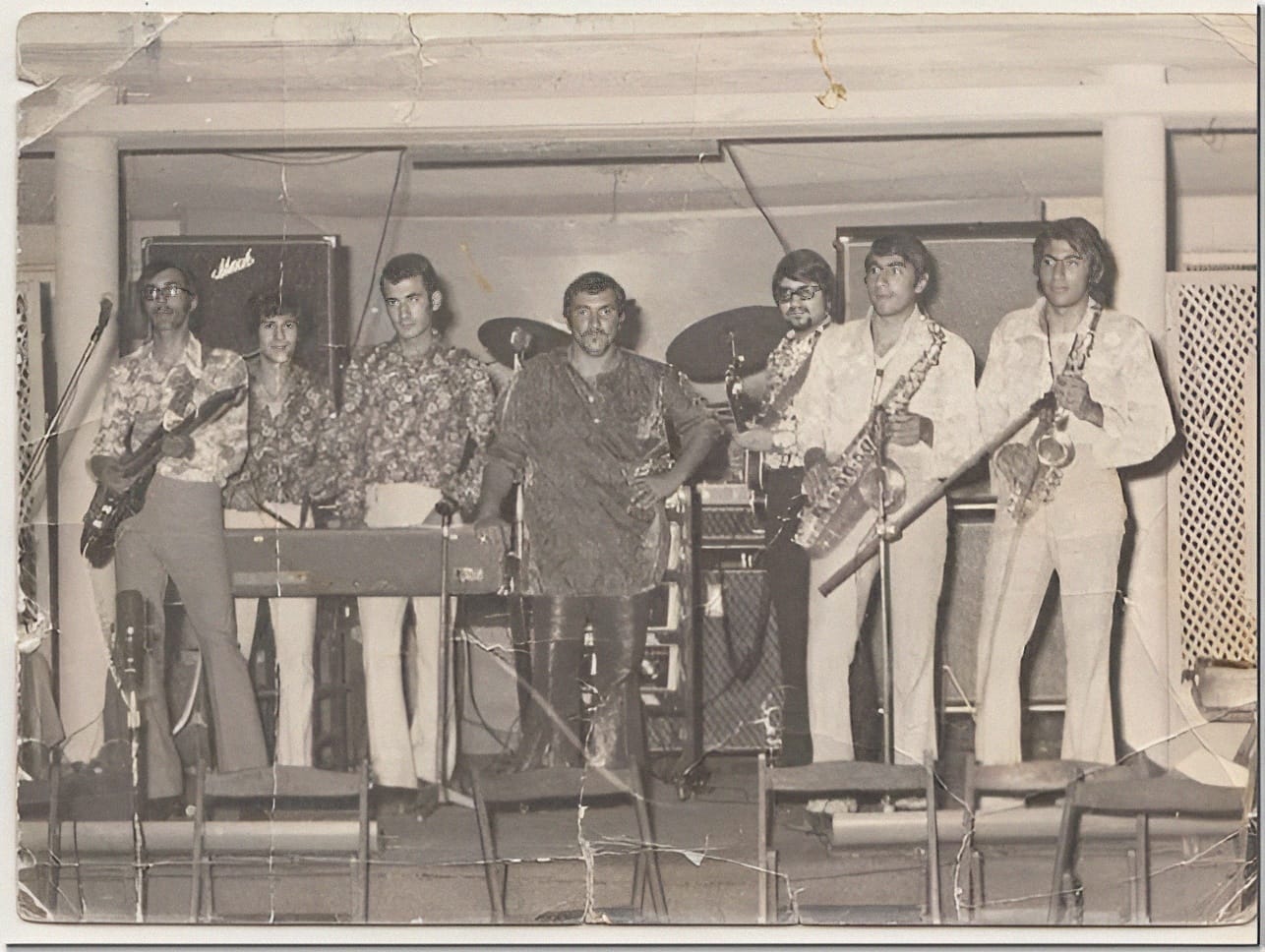
However, as the winter of 1971 approached, The Black Coats were about to sign at popular venue Tamerina for the second winter season in a row. Things kept getting inexplicably delayed from the venue’s side, resulting in The Black Coats barely being able to perform that entire winter. Shortly after, Yehia would leave for the UK, and keyboardist Magdi El Hosseiny would go on to become a staple in Umm Kulthum and Abdel Halim Hafez’s bands. The Black Coats would continue until Ismail Al-Hakim’s shock passing in 1979.
Decades later, Yehia El Shamaa says some sources revealed to him that Abdel Halim Hafez was personally involved in The Black Coats not landing the Tamerina residency in 1971 due to a mix of jealousy paired with conservative notions. The band had built a reputation for gathering unruly crowds that were frowned upon despite no recorded incidents at any of their concerts.
Les Petits Chats, on the other hand, were not at all a topic of controversy. They had a much more European influence and sang more romantic songs from across France, Italy, and Latin America. More suitable for people on dates, the band’s concerts serenaded thousands of young couples. In addition to being the longest-running band, it also saw many of its members at different points in time go on to become some of the most influential figures in the Egyptian music industry.
It was founded by singer Wagdi Francis, the famous composer and pianist Omar Khairat, who ironically was a drummer with no formal training at the time, and keyboardist Ezzat Abou Aouf, who would go on to become a famous actor, talk show host, and director of the Cairo International Festival. The band’s lineup would feature other prominent figures throughout its lifetime, such as legendary guitarist Omar Khorshid, composer Hani Shenouda, who would play a key role in modernising Egyptian pop music and launching the careers of Amr Diab and Mohamed Mounir, and Sobhi Bedeir, a classically trained tenor who would become president of the Cairo Opera House for many years.
Les Petits Chats’ stardom would grow consistently throughout the ’70s. They would perform at every major venue and event during that period and even land a two-month residency in Lebanon, where they cultivated a regional following. Les Petits Chats had officially achieved stardom no less than that of any rockstar at the time, complete with their own groupies and die-hard fans. Pino Phares recalls a funny story involving Led Zeppelin’s iconic guitarist Jimmy Page on a visit to Cairo in 1977.
“We were playing at the Cairo Sheraton that winter and taking five between sets while belly dancer Nagwa Fouad was doing her number. I was on the phone with a girl I was trying to date, and a tall Englishman walked up to me and asked me if I knew Led Zeppelin. I figured he was making a song request, so I said ‘Yes, sure.’ I continued with my call, but he just stood there. He interrupted me again and asked if I knew Led Zeppelin’s guitarist. I said, ‘Yes, of course, Jimmy Page!’ He said, ‘Well, Jimmy’s here, and he’d like to meet you.’ My first response was, ‘Here in Egypt?’ He laughed and asked me to come with him. I go to the bar and greet him, and he asks first what guitar I’m playing. I told him it was a Gibson Black Beauty, and he turned to his manager and said, ‘I told you.’ Then he went on about how he last touched a guitar three days ago and how all his gear was being shipped for the tour. He asked me if he could play mine. I ran up on stage while Nagwa was still dancing to grab it, and we went to my room. He sat on the floor and played for a bit, then we convinced him to join us on stage. He agreed, and when Ezzat Abou Aouf eagerly introduced him over the mic, not a single audience member even batted an eye.” He laughed. “Now I understand – it was hard to follow up with Nagwa Fouad and anything else.”
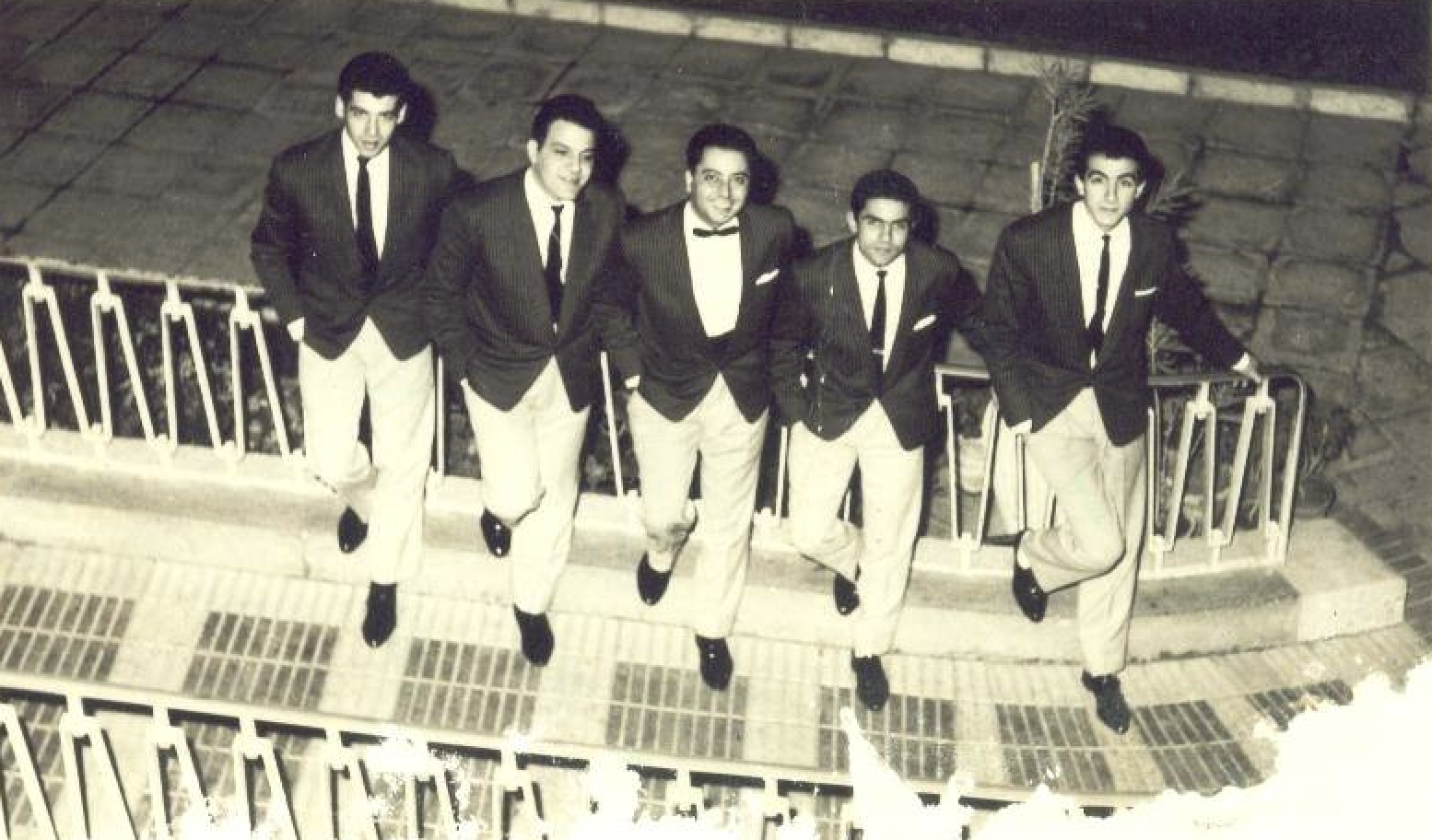
By the time the ’80s arrived, there had been a noticeable decline in the appetite for Western music in Egypt, thanks to the rise of the new form of Egyptian pop music spearheaded by the likes of ex-Les Petits Chats member Hani Shenouda and his band Al Massrieen as well as Ezzat Abou Aouf’s 4M sometime later. Western cover bands had turned from superstars to a segment offered by international hotels to appeal to a wider variety of guests. In a 2015 documentary by Egyptian filmmaker Sherif Nakhla, he follows Les Petits Chats ahead of a planned reunion concert in 2010.
Sherif had grown up browsing through his stepdad Wagdi Francis’s photo albums full of Les Petits Chats pictures. He knew his dad was a singer and had a band but never quite understood their impact until he noticed how people greeted Wagdi and how his friends’ parents’ eyes lit up when they found out his dad was the founder of Les Petits Chats. When the reunion concert was set, he embarked on a mission to shoot a short promo video for the promoters telling the band’s story. He intended to focus his efforts on creating a concert movie. However, Sherif ended up with hours of footage from the band’s comeback rehearsal and realised he had much more on his hands than a concert film. It was a journey back in time that the band had taken us one song at a time from a tiny, cramped studio. It was as if they hadn’t stopped playing together a single day.
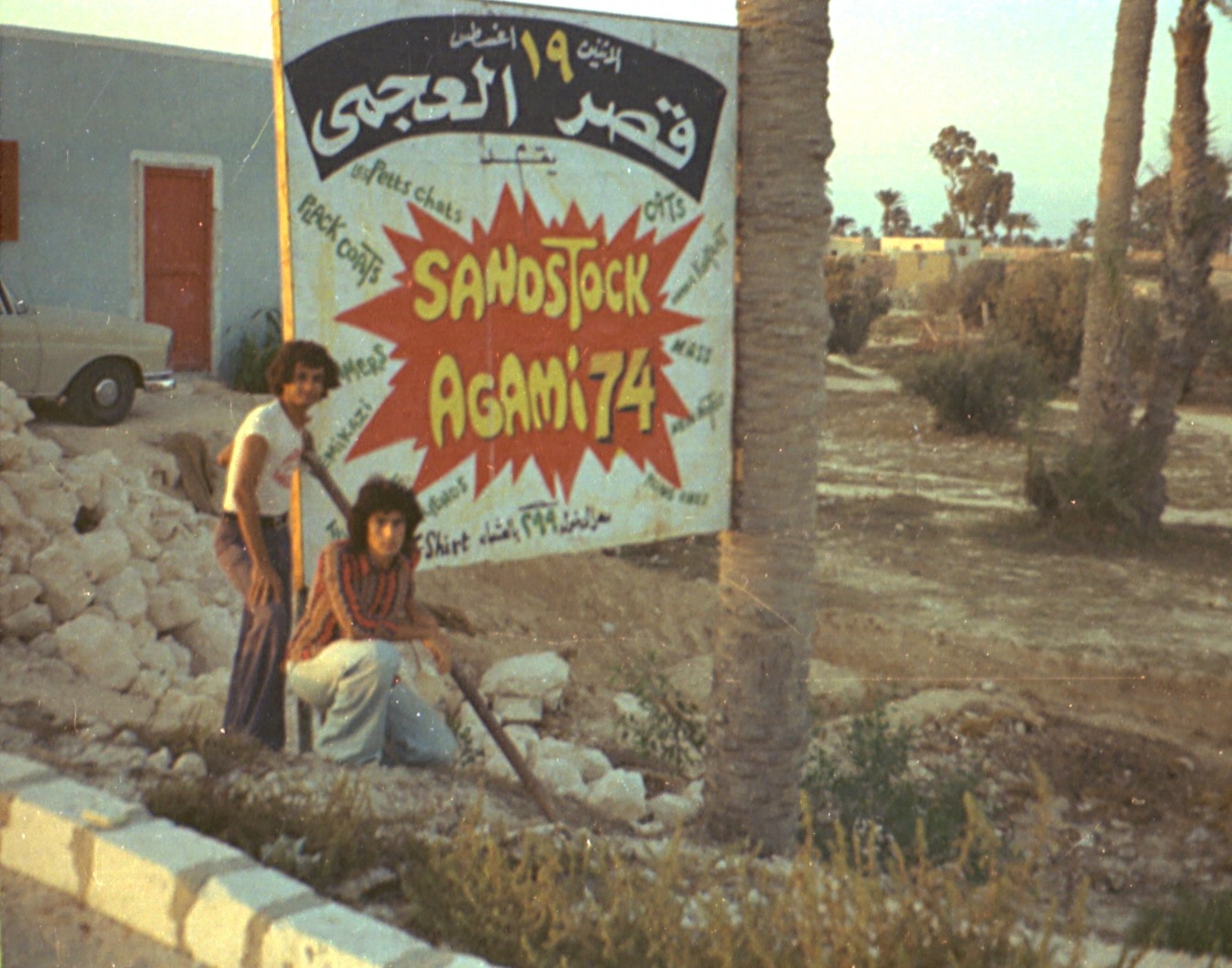
When asked why Les Petits Chats achieved so much success despite being a cover band at the end of the day, Sherif said, “Because they represented the spirit of the time. When people go back and think of Les Petits Chats, they don’t think about the songs. They think about what life was like back then. You’d think that because of the wars and everything that was going on at the time, life was unbearable, but no. People used to gather around them. The mentality was different. Romanticism was different. During my time with them, I learned what it means to enjoy life, to be able to speak your mind, and not be ashamed to show love to your brothers or see it as a sign of weakness. For them, it was very cool to be a gentleman. I learned their spirit. I learned to balance respect with love with doing something until the end, doing it full-heartedly. I’ve been trying to apply that in my life ever since.”
Looking back, the bands of the 60s and 70s in Egypt were more than just cover bands—they embodied a spirit of change. The Arabic song of the time had peaked, and young people yearned for what was to come; while the Arabic song wouldn’t reinvent itself until the early 80s, those bands played an essential role in giving people an outlet and providing musicians like Hani Shenouda and Ezzat Abou Aouf, many of whom started in Western cover bands themselves, some food for thought on where the Arabic song was going next.
Words: Fady Nageeb